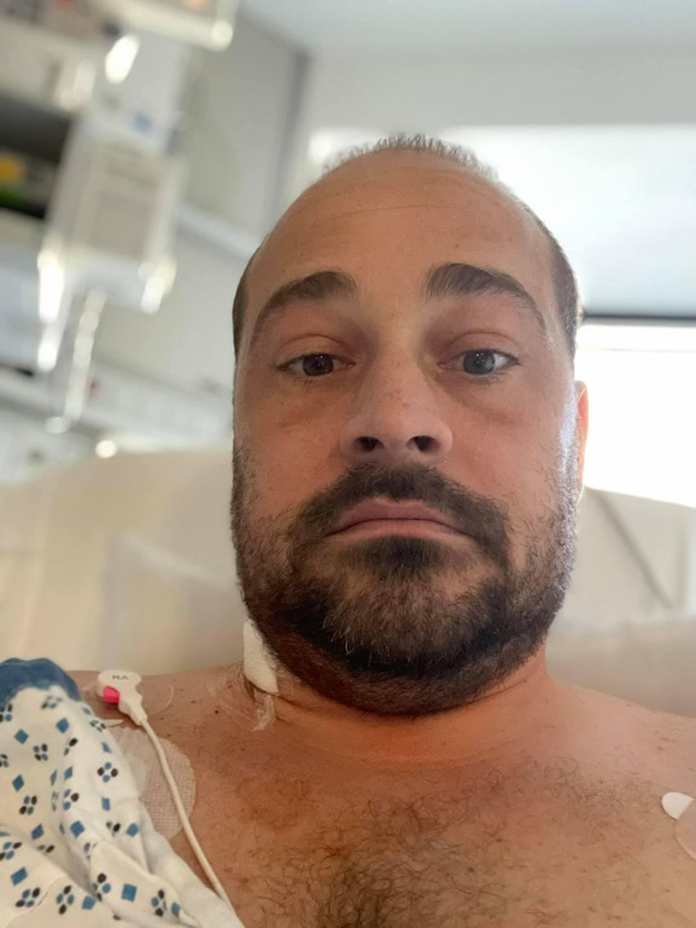
POINT PLEASANT – Imagine undergoing a double organ transplant during the age of COVID.
That’s what happened to Point Pleasant resident Patrick McGlone, 40, who was born with Type 1 diabetes, once known as juvenile diabetes.
McGlone received a kidney and pancreas, and was part of a historic milestone in receiving two of the 40,000 transplanted organs in the United States this year, which is not only a national record but a world record, according to the United Network for Organ Sharing (UNOS).
UNOS is a non-profit organization that unites organ donors and those in need of transplants, helping to remove barriers faced by patients and making the system more efficient.
Patrick McGlone’s story began when he was diagnosed with Type 1 diabetes at 18 months old. With Type 1 diabetes, your body stops producing insulin and then glucose builds up in the bloodstream. Untreated, it can result in a coma or death.
His life became centered around having his blood sugar levels tested and insulin injections, but even with great care, when he was 16, lab tests showed that protein was building in his blood and he developed high blood pressure.
“I made the jump at 18 and got an insulin pump,” McGlone said in a phone interview. “The control was incredible because the insulin is constantly being delivered.”
While he was 20 and getting his engineering degree at Rutgers University, McGlone suffered a “collapse,” or a tightening or choking of his renal arteries, which feed blood to the kidneys. He spent five days in the hospital where they flooded him with water and IV fluids.
Afterwards, he said he did his best to live a normal life and he was pretty stable until 2019, which he called “a horrible year for me, health-wise.”
The year started with a series of mini-strokes. During one of them in particular, he was at work at his office in Manhattan where he runs an engineering team. Suddenly, he could not think straight and could only speak gibberish. He also experienced weakness on one side of his body, numbness, tingling and head pain.
“It’s common for Type 1 diabetics to have TIAs (transient ischemic attacks, or mini-strokes) and CVAs (cerebrovascular accidents) because of high blood pressure, no matter how good you are at controlling it,” McGlone explained.
Doctors found that he had cardiovascular disease, or hardening of the arteries around his heart, and congestive heart failure.
“I had an emotional response, it was scary,” he recalled. “The (congestive heart failure) was caused by a fluid overload because of kidney failure.”
In August 2019, McGlone woke up and felt like he had acid running through his veins. He went to Ocean Medical Center in Brick where they found extremely high creatinine levels. What followed the first day of two years of dialysis.
“I knew this day was coming,” he said. “They took me right upstairs to the surgical suite and gave me a temporary intrajugular catheter and I started on dialysis right away. After the first treatment I started to feel better.”
He spent a week in the hospital when he eliminated about 40 pounds of fluid from his 5’6” frame.

From August 2019 until June 2021, McGlone underwent dialysis for four hours, three times a week. The COVID-19 pandemic was in full swing, so he had to sit alone during his treatments and wear a mask the whole time.
“One day I looked around [while having dialysis] and I thought, ‘I don’t belong here; I’m 38 – almost 50 years younger than the other dialysis patients,’” so he asked his doctor about alternatives and about a possible kidney transplant.
The hospital provided the initial information, and McGlone was told the waitlist for organ transplant begins on the first day of dialysis. His doctor recommended a combination pancreas/kidney transplant. One of the benefits is there is a shorter wait time for dual transplants, McGlone said.
What followed was red tape and wrangling with health insurance, but McGlone was accepted into Mt. Sinai after going through their transplant process.
At the end of May 2021, he got a call from Mt. Sinai at 10 p.m. to let him know there was “an active offer” for a kidney and pancreas.
“The coordinator gives you the rundown on the donor,” he said. “The donor died of a drug overdose, and [the donor] had taken so many drugs the coordinator had to take a breath in the middle of naming all the drugs that were in their system. It was the first offer, I was a little gun shy and I didn’t feel right about it, so I declined.”
About a week later, McGlone got a second call. Another donor had died of a drug overdose, but this one had the same blood type – the somewhat rare B positive – so McGlone accepted. (UNOS said that 16% of deceased donors die of drug intoxication.)
Within two hours, he was at Mt. Sinai where the team was waiting for him. Despite COVID restrictions, they allowed his husband, Nicolas, to accompany him.
“The surgical team has up to 18 hours to decide if you’re going forward,” he said. “There could be something wrong with the organ(s), something wrong with the transport, something wrong with the recipient – such as very high blood pressure – but I got through the testing,” he said. “They wheel you into the operating room, I got on the table and they basically say, ‘see you on the other side.’”
He fell asleep and woke up in recovery.
Transplanting a kidney usually only takes a couple of hours, McGlone said, but transplanting a pancreas is much more involved. Part of his bowel had to be cut and attached to the donor’s bowel.
There had been complications during the surgery. Both organs had staple holes from the transport process and when they were connected to McGlone’s vascular system, blood sprayed out of the holes. He required six units of blood and two units of fluid.
After his surgery, one of the doctors came into his room with some good news.
“She said ‘I am here to tell you that you are no longer an insulin-dependent diabetic.’ I choked up, that made it all worth it,” he said. “I feel like I got my brain back because I don’t have to think about needles, or insulin, or is my pump full…all that worry went away.”
He spent 10 days in the hospital, and aside from being sore and bloated, had little pain from the surgery, which left a scar measuring about 14 inches near his navel.
Surgeons told him he was in for a lengthy recovery – up to a year – but after just three months, McGlone returned to work, riding the bus to Manhattan every day.
For the rest of his life, McGlone has to take drugs that suppress his immune system so that his body does not reject the transplanted organs. He said getting something as simple as a cold could be fatal.
“I feel like I’m 20,” he said. “I’m such an advocate for organ transplants. With the new year, I’m a new me. Everyone can sign up, everyone should sign up,” McGlone said. “Just do it.”






